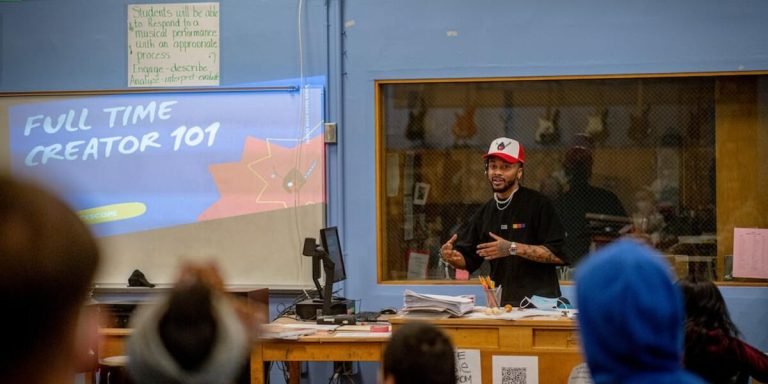Parent Communication: Fostering Better Understanding in Childhood Education
Parent communication in childhood education forms an integral part of a child’s growth and development. This process involves sharing insights, aspirations, feedback between parents and teachers to create an effective learning environment. It helps bridge any educational gaps by fostering collaborations that lead the way towards improved student outcomes.
The role of parent communication cannot be understated in molding a holistic approach to education. As involved parties navigate through various challenges associated with educating youngsters during their crucial formative years, promoting better understanding becomes pivotal for both educators and parents alike. The following paragraphs will delve into how this dynamic can enhance overall teaching methodologies while transforming children’s academic experience.
Did you know?
A study by Harvard Family Research Project shows that effective parent-teacher communication increases student’s school engagement and impacts positively on their achievement.
Understanding the Role of Parent Communication in Child Development
The role of parent communication in child development is pivotal, especially in the context of integrating technology into education. In today’s digital age where we’re seeing a major transition towards online learning and educational apps, fostering strong parental involvement becomes even more crucial.
Parental interaction not only provides emotional support but it also greatly impacts children’s attitude towards their studies and overall school experience. Parents act as the primary educator for their child before they enter formal schooling. Hence maintaining an open line of communication between parents and educators can significantly enhance a child’s academic performance.
More importantly with new technological advancements shaping our teaching methodologies every day— be it Artificial Intelligence (AI), Augmented Reality (AR) or Cloud-based Learning Management Systems — ensuring smooth parent-teacher collaboration is key to adapting well to these changes at home too.
Furthering this point, research unearths that when parents understand which resources are being used by teachers – they can integrate similar tools at home thus providing consistency for young learners on both fronts – enabling them to excel tremendously!
In summing up, effective parent communication stands as integral part of childhood education particularly underpinning successful integration within modern-day tech-driven instruction paradigm! It fosters a supportive environment allowing kids enjoy learning while growing intellectually emotionally thereby helping shape bright future generations!
The Impact of Regular Dialogue Between Parents and Educators
In the modern era of 2023, parent-educator communication isn’t a choice but a necessity. Parents and educators must regularly engage in meaningful dialogues to foster an effective learning environment for children.
During these interactions, parents can share insights about their child’s preferences, strengths, challenges or any behavioral changes they might have noticed at home. These details prove invaluable to teachers as it gives them important context which impacts how they approach teaching each unique student.
On the other hand, feedback from educators offers parents clear visibility into their child’s academic progress and behavior within classroom settings – something that is increasingly crucial when we consider technology integration in education.
Research shows regular dialogue also plays key role during instances where special attention may be required due its proven ability to enhance early detection of signs related with potential issues whether academically or emotionally .
Good rapport further aids significantly during implementing new tech-tools designed specifically aimed improving childhood education making transitions smoother students thus yielding better results overall irrespective age group category falling within scope study focusing ‘Parent Educator Support’.
Strategies for Effective Communication Across Different Age Groups
Effective parent communication plays a crucial role in childhood development. The integration of technology in education opens new avenues for parents and educators to foster better communications across different age groups. Here are strategies that effectively utilize this principle:
At this stage, children are rapidly developing their cognitive skills and learn best through play; hence they may not understand complex language structures yet.
Technology can enhance interaction with them by using visual aids such as animated videos or interactive games on tablet devices which have been found beneficial in enhancing learning stimulation while encouraging easy conversation among parents or caregivers.
As children grow older, their ability to comprehend information expands drastically.
Parent communication at this stage garners maximum impact when direct conversations complemented with tech tools such as educational apps or virtual tutoring sessions is used regularly to discuss academic progression and personal growth areas of improvement day-to-day activities.
Adolescence brings about swift changes both physically and emotionally making effective parental engagement more critical than ever before.
Virtual platforms allow for open discussions where adolescents can voice concerns without fear of judgement helping build trust – vital for emotional well being alongside proper decision-making attributes integral personality sculpting periods .
Tools and Platforms to Enhance Parent-Educator Interaction
Embracing technology in education has become more than a trend; it’s now an integral part of the learning process. A pivotal aspect where this integration is benefiting significantly, lies within parent-educator interaction. Today, there are various tools and platforms dedicated to enhancing this crucial communication channel.
Technological innovation provides opportunity for seamless two-way communication between parents and educators around the clock. It allows sharing real-time updates on student performance and behavior that can inspire actionable strategies at home as well as school settings.
Moreover, these digital portals offer transparency by allowing parents access to key information including academic calendars, syllabuses or even the ability to schedule appointments with teachers directly online – thus creating a strong partnership aimed at advancing children’s educational growth.
In turn, schools get insights into parental concerns and suggestions through active engagement via surveys or forums integrated within these platforms – fostering increased collaboration towards shaping better teaching methods & practices.
Through such advancements in ed-tech platforms designed for nurturing parent-teacher relationships we move forward ensuring efficacious childhood education system possible despite geographical boundaries or time constraints presented by everyone’s busy daily schedules.
Evaluating Digital Solutions for Streamlined Communications
In 2023, a critical aspect of childhood education is the seamless interaction between parents and educators. In today’s day and age, digital solutions have proven to be an invaluable tool for parent communication in schools. Analyzing these platforms can help us comprehend their efficacy.
Firstly, it’s important to understand how these tools function. Digital platforms primarily serve as interactive portals where teachers offer updates on classroom activities or share students’ progress reports directly with parents without any delay or miscommunication issues that usually occur with traditional methods like paper-based diaries or face-to-face meetings.
When evaluating such digital solutions for streamlined communications, one must look at the ease of use from both ends – the teacher’s end and the parent’s end. An ideal platform would need minimal technical knowledge so even those who aren’t tech-savvy can easily operate it.
Another crucial point of consideration is privacy protection measures implemented by these applications because they handle sensitive information about children. Therefore, robust data encryption protocols are non-negotiable components when assessing potential options.
Moreover, multilingual support offered by digital tools should not be overlooked either especially considering diverse linguistic backgrounds exist among families attending a particular school increasingly common given globalization trends noticed worldwide over recent years into current ones too!
Lastly but importantly we consider customer service channels available if users encounter problems while utilizing software – do developers respond promptly? Are there comprehensive manuals written unequivocally which newbies may refer back anytime during difficulties?
Implementing Parent-Teacher Conferences For Collaborative Problem-Solving
In the digital era of 2023, implementing parent-teacher conferences for collaborative problem-solving has become an integral part of child education. By leveraging technology and specific tools designed to promote interaction between parents and educators, we can overcome traditional barriers in communication.
Primarily, innovative platforms have made it possible for parent-educator discussions to be conducted virtually. With a simple click on their smartphones or computers, both parties can now establish connection independent from physical boundaries or time constraints. This accessibility facilitates frequent engagements which are crucial for continuous progress tracking and timely intervention in case any academic hurdles arise.
An essential feature is also real-time messaging where immediate clarifications could be asked during sessions thereby fostering better understanding between parents and teachers regarding children’s learning capabilities – a key element often overlooked in conventional preset conference schedules.
Building a Supportive Community Around Student Success
In recent years, as technology continues to evolve and permeate every facet of our lives, it is no surprise that its integration into education has become a focal point. Parent communication plays a significant role in this change process. Parents are crucial stakeholders in their child’s educational journey and emphasizing strong parent-educator partnerships is vital for student success.
Building a supportive community around each students’ academic achievements starts with open lines of communication fostered by advancements in technology. From online portals where parents can easily track grades and assignments, to email or text message updates from educators regarding class activities or individual student progress – the dialogue between home and school now extends beyond traditional parent-teacher conferences.
The emphasis on technological inclusion not only transforms teaching methodologies but also encourages active engagement from parents who have an up-to-the-minute understanding of what their children are learning at school. This real-time insight allows them to provide relevant support outside classroom hours further solidifying the learning experience for youngsters.
Fostering an Environment of Shared Responsibility
In 2023, fostering an environment of shared responsibility in childhood education has never been more crucial. As we navigate the digital age, integrating technology into everyday learning extends beyond just classrooms or textbooks – it involves building a supportive community around student success.
Parent communication plays a pivotal role in this process. It’s about creating an open dialogue between educators and parents that can help establish what is best for each child’s educational journey. Increased parent engagement often results in improved students’ performance as they feel validated and supported both at home and school.
Here are four ways to build on your existing efforts:
1) Frequent Communication: The importance of regular updates cannot be overstated when it comes to enhancing parent-teacher relationships. Use various modes like emails, text messages or mobile apps to send out weekly highlights about their children’s performance or any upcoming events related tasks.
2) Utilize Technology: Techniques such as video-conferencing call appointments make parents’ lives simpler by giving them opportunities for face-to-face discussions despite distance constraints.
3 ) Shared Online Platforms: Setting up online platforms will not only enhance connectivity but also ensure all information regarding assignments, grades, schedules are accessible anytime anywhere.
4 ) Parental Involvement & Training : Encourage active parental involvement with workshops describing how they can aid their kids using particular software tools used within the curriculum.
Organizing Events and Workshops to Boost Engagement
In our quest for enhanced student success, organizing events and workshops to boost engagement has proven to be indispensable. It is a strategic approach not just in keeping parents involved but also in reinforcing parent communication – an essential aspect of childhood education.
Creating opportunities for active participation encourages connection and fosters a supportive network around the child’s educational journey. By providing platforms where educators, students, and parents can collectively engage with each other aids technology integration – one of 2023’s most transformative trends in education.
First off are parenting workshops that offer insightful sessions about modern techniques used within learning spaces–particularly digital learning tools which have gained prominence over the years. In these interactive gatherings, participants delve into discussions on applications or online portals being utilized by kids at school. This opportunity allows them to understand how certain apps facilitate effective comprehension of lessons while holding their children’s interests intact.
Furthermore, conducting hands-on tech tutorials designed explicitly for parents strengthens their grasp on this cutting-edge teaching methodology. As they become more adept with various edtech platforms’ functionality through such initiatives could help reduce any apprehension or confusion towards new classroom technologies introduced.
Conclusion
In summary, parent communication plays a vital role in advancing the educational journey of our youngsters. It’s not just about attending school meetings or signing off homework; it’s an ongoing relationship filled with active listening, open dialogues and constructive feedback. This synergy doesn’t only foster better understanding among parents and educators but also assures kids that they are supported holistically – at home and in school.
Feel free to explore more insightful topics on childhood education through our website. We strive for every page to be packed with information that can streamline your experience as both an educator or a parent trying to navigate this crucial phase of life effectively. Remember – when we come together for children’s development, magic happens!







